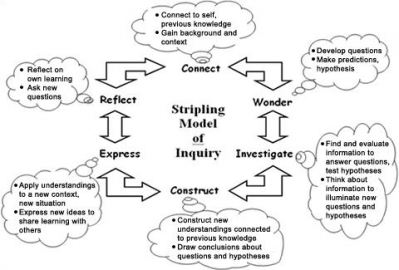Teaching for Learning: Inquiry Learning
Update December 2020:
This web page is a companion to the 2016 version of the School Library Program Rubric. NYSED released an updated School Library Program Rubric in December 2020.
Student Snapshot: Independent learners ask questions, evaluate information to improve understanding, and develop social responsibility and strategies for self-assessment.
Kuhlthau (2015) states that “inquiry learning emphasizes personally relevant questions that inspire students to learn more and create unique ways of sharing what they have learned. Guided Inquiry raises the bar even further to move students to deeper learning by incorporating the research process explicitly into their work.”
*Source: Kuhlthau, Carol, Collier, Leslie K. Maniotes, and Ann K. Caspari. Guided Inquiry: Learning in the 21st Century. Libraries Unlimited, 2015.
Citation for Photo: Stripling, Barbara. Stripling Model of Inquiry.
In Practice
Lesson Plans
Description: Smithsonian Education explains that their lesson plans “emphasize inquiry-based learning using primary sources and museum collections.” With high-quality images, engaging activities, questions to spark students’ interest, and open-ended ways to continue inquiry and learning, these lesson plans contain all the materials needed for classes on everything from poetry to outer space.
Resource/Citation: Smithsonian Education. "Educator Lesson Plans." Smithsonian Education, 2013.
C3 Teachers Inquiries
Description: The C3 Framework emphasizes inquiry in learning and opens more doors for SS teachers and librarians to collaborate. The C3 teachers website contains many sample inquiries.
Resource/Citation: C3 Teachers. "Inquiries." C3 Teachers.
New York State K-12 Social Studies Framework
Description: The New York State K-12 Social Studies Framework is designed to prepare students for college, careers, and civic life with courses that are rigorous and aligned to New York State Learning Standards. This Framework integrates existing New York State Learning Standards and the New York State Core Curriculum for Social Studies into a single, three-part document. It is intended to serve as a guide for local districts in developing their Social Studies curricula. Social Studies practices are identified, as well as the key ideas, conceptual understandings, and content specifications.
Resource/Citation: New York State Education Department. "New York State K-12 Social Studies Framework." EngageNY, 4 Mar. 2016.
Think Tank Library: Brain-Based Learning Plans for New Standards, Grades K-5
Description: A blueprint for crafting exciting inquiry lessons developed from content area standards that will inspire teachers and encourage students to think critically.
*Resource/Citation: Ratzer, Mary Boyd, and Paige Jaeger. Think Tank Library: Brain-based Learning Plans for New Standards, Grades K-5. Libraries Unlimited, 2015.
Think Tank Library: Brain-Based Learning Plans for New Standards, Grades 6–12
Description: A blueprint for crafting exciting inquiry lessons developed from content area standards that will inspire teachers and encourage students to think critically.
Resource/Citation: Ratzer, Mary Boyd, and Paige Jaeger. Think Tank Library: Brain-based Learning Plans for New Standards, Grades 6-12. Libraries Unlimited, 2015.
In Theory
The Empire State Information Fluency Continuum
Description: The ESIFC emphasizes the importance of inquiry in learning and establishes information fluency standards for grades K-12, which are aligned with Common Core Learning Standards. The fusion of the two sets of standards aims to create students who are capable of absorbing and applying appropriate information to any situation. The document identifies three information literacy standards which encourage students to be thinkers, explorers, and citizens while outlining the essential steps of inquiry: connect, wonder, investigate, construct, express, and reflect. The continuum includes grade-specific benchmarks for information skill development, sample diagrams and worksheets which may be used to assess students’ progress. There is a chart for administrators, teachers, and librarians that links progress along the fluency continuum with various Common Core Learning Standards in reading, writing, and speaking & listening. The continuum is used to apply Common Core Learning Standards to real-world classroom teaching and is a great resource to use for grade-specific lesson planning.
Resource/Citation: School Library System of New York State (SLSA) and New York Library Association (SSL) . “The Empire State Information Fluency Continuum”. School Library System of New York State, 1 May 2019.
Inquiry-Based Learning
Description: The University of Illinois’ Graduate School of Library and Information Science provides a detailed background on inquiry-based learning, including models of how students learn, connections to literacy, and suggestions for strategies and classroom activities. Discussion includes librarians’ roles in reaching marginalized students, collaborating with classroom teachers, and connecting to the Common Core.
Resource/Citation: Youth Services Librarianship. "Inquiry-Based Learning”. Youth Services Librarianship.
An Exploration of the Inquiry Process
Description: In a column for the American Library Association’s journal, Mary Keeling reviews how emphasis on an inquiry-based process affects librarians’ work. She briefly summarizes the concepts behind inquiry learning, then highlights the articles included in the journal.
Resource/Citation: Keeling, Mary. "An Exploration of the Inquiry Process." Knowledge Quest, vol. 42, no. 2, 2014, pp. 6-7.
Research Guide
Description: Springfield Township High School’s library website includes a guide to research and inquiry for high school students. An overview of the importance of research, a breakdown of the research process, and a rubric for evaluation supplement videos and links to further information.
Resource/Citation: Valenza, Joyce. "Research Guides." The Research/Inquiry Process, 27 Oct. 2015.
School Libraries, Librarians, and Inquiry Learning
Description: This resource provides the history of inquiry, its alignment with 21st century learning standards, and how school librarians and teachers can implement inquiry teaching and learning.
Resource/Citation: Levitov, Deborah. "School libraries, librarians, and inquiry learning." Teacher Librarian, vol. 43, no. 3, 2016, pp. 28+.
Consultant
Name: Sara M. Kardasz
Email: skardasz@wsboces.org
Bio: Thirteen years experience as a School Library Media Specialist working with 3rd through 12th grade special education students in a special act school. Currently Coordinator of the School Library System at Western Suffolk BOCES.
*To access restricted database articles speak with your school librarian or public librarian.







